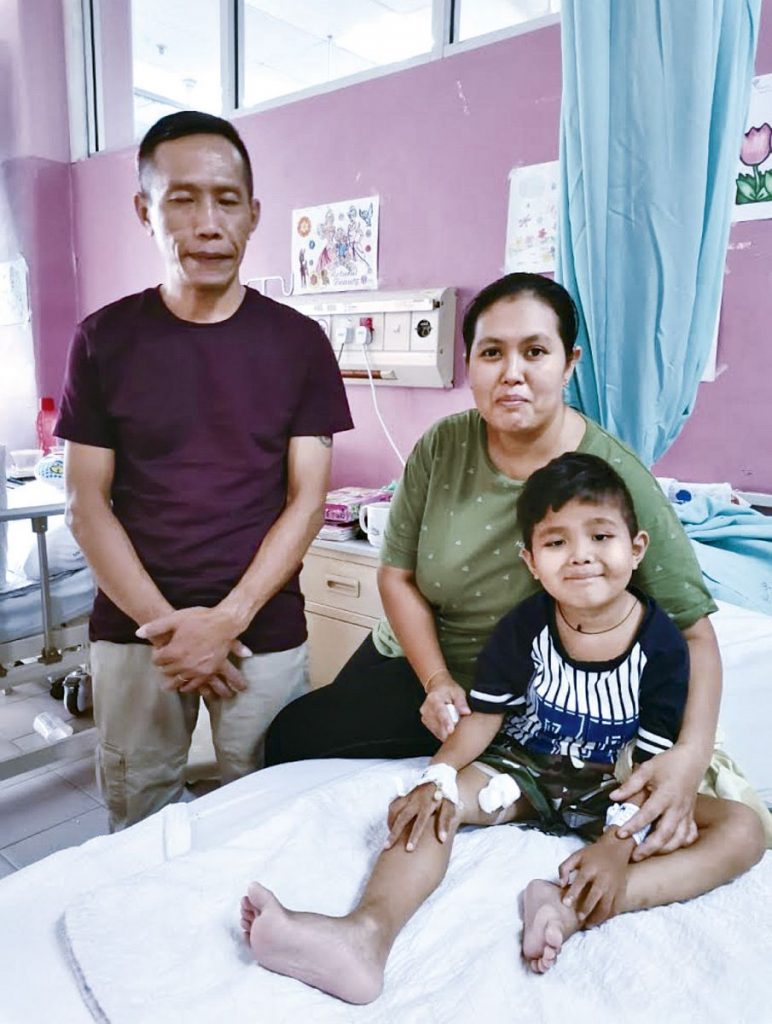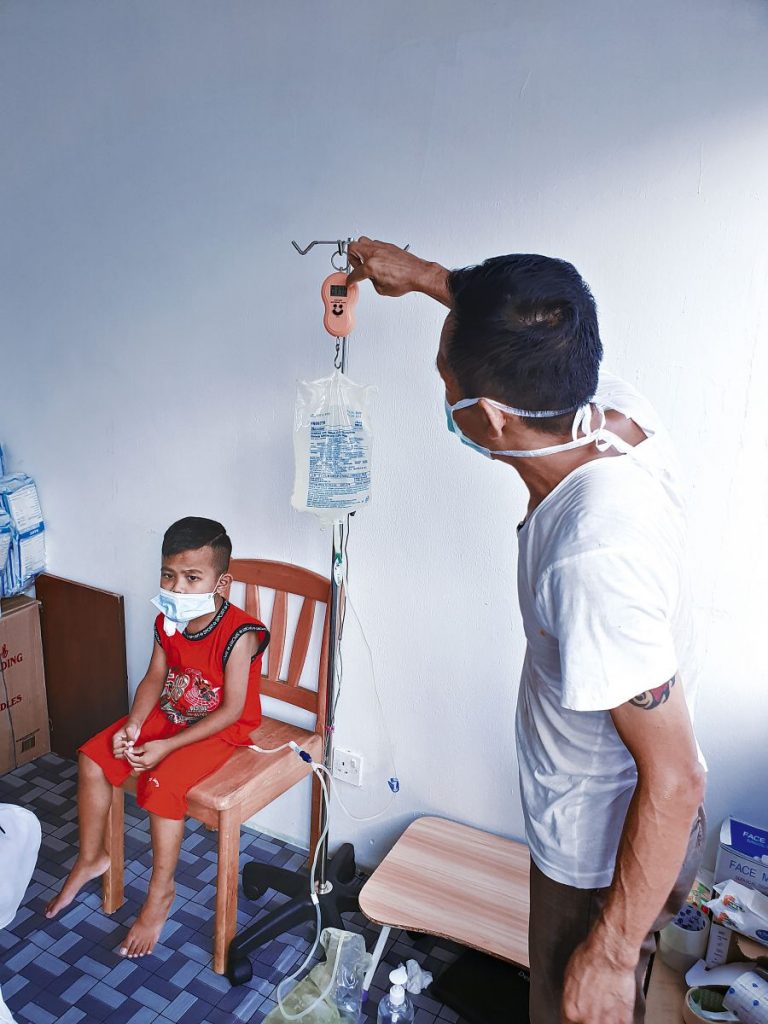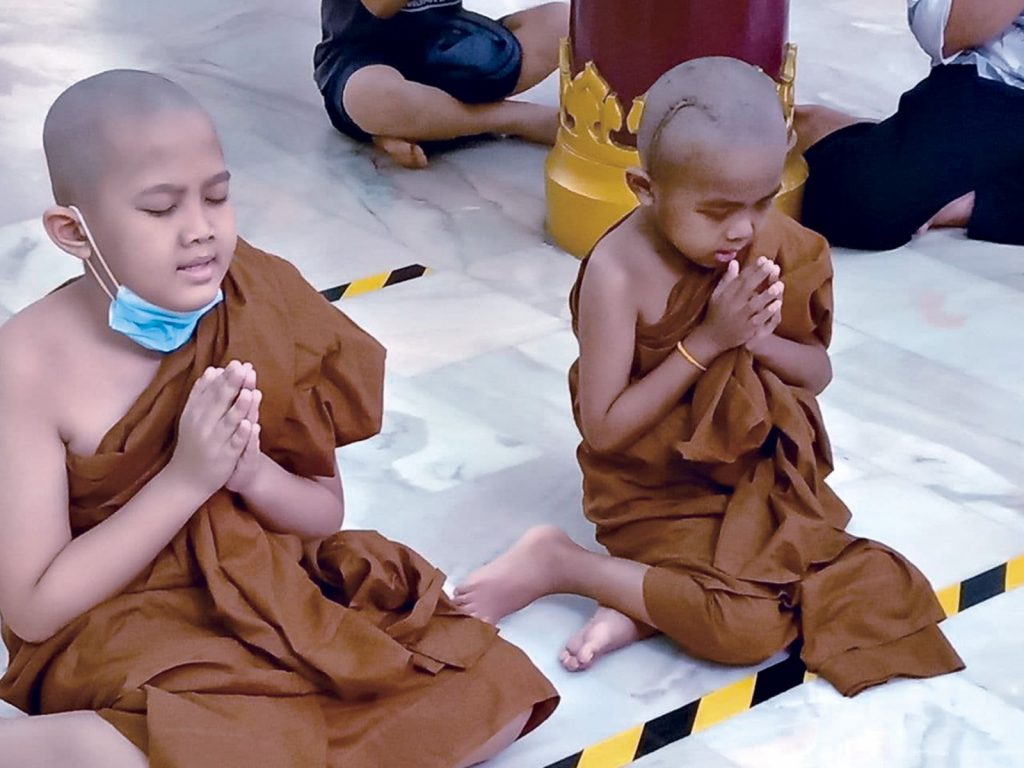Sai Sai's Three Wishes
By Malaysian Tzu Chi documenting volunteers
Photos by Teoh Bee Ling (張美玲)
Compiled by Cecelia G. C. Ong (王慈惟)
Translated by Wu Hsiao-ting (吳曉婷)
Sai Sai's Three Wishes
By Malaysian Tzu Chi documenting
volunteers
Photos by Teoh Bee Ling (張美玲)
Compiled by Cecelia G. C. Ong (王慈惟)
Translated by Wu Hsiao-ting (吳曉婷)
In January 2020, Tzu Chi Malaysia received an inquiry from Médecins Sans Frontières (Doctors Without Borders) asking if Tzu Chi could help a refugee boy receive dialysis treatment. That was how Tzu Chi volunteers in Penang came to meet Sai Sai. The boy was going to celebrate his seventh birthday when the volunteers first visited him at Penang General Hospital. Though he was severely ill, his face and four limbs swollen, he was all smiles that day.
The connection between Sai Sai and Tzu Chi lasted for more than a year. It was in January 2021 when the hospital notified Tzu Chi volunteers that the central venous catheter that had been placed in the boy was blocked again. If the problem couldn't be solved, they'd be forced to stop giving him dialysis.

Sai Sai poses with his parents in a ward at Penang General Hospital on January 2, 2020. It was the first time Tzu Chi volunteers met the boy.
From Myanmar to Malaysia
Sai Sai's parents are Burmese Shan people. They were lucky to emerge unscathed from devastating Cyclone Nargis in their home country in 2008 only to get caught up in a civil war. U Sai Tun, Sai Sai's father, fled to the mountains to escape from the war. The young man laid low for a time, but decided that he couldn't remain in hiding forever. At the urging of some fellow villagers, he made up his mind to leave Myanmar. The party of people set off on foot from Htantabin Township, Bago, heading to the border of Thailand. They arrived two days later. They were originally planning to stay in Thailand, but some people they met convinced them it would be better to travel further by car to Malaysia. The group finally arrived in Penang, northern Malaysia, after traveling a total of 1,881 kilometers (1,170 miles).
Once in Malaysia, U Sai Tun started working in a restaurant near where he lived. His wife, Daw Nang Owmar, worked there, too. The couple led a relatively stable life until their second son, Sai Sai, came along.
Sai Sai was diagnosed with congenital kidney failure as soon as he was born. His doctor decided in early 2020 that the boy needed to undergo immediate dialysis to save his life. The medical cost, however, was beyond the family's means—though they were registered refugees with the United Nations High Commissioner for Refugees (UNHCR), they were not citizens of Malaysia, and thus would have to pay a large medical bill if Sai Sai underwent regular peritoneal dialysis treatment. Their boy's life was on the line. What could they do?
Just as the family was on the verge of plunging into despair, a group of strangers came to their rescue.
On January 2, 2020, Dr. Tan Kiat Beng (陳吉民) and Nurse Teoh Bee Ling (張美玲), volunteers from the Tzu Chi International Medical Association, visited Sai Sai at the hospital after the boy's situation was brought to their attention. His birthday was on January 22, just three weeks away, but he was experiencing the most difficult time in his life. Even so, the smile on his face was so sparkling and innocent it pulled at the heartstrings of the two visitors.
As soon as they left the hospital, Dr. Tan began contacting other Tzu Chi volunteers to discuss how to help save Sai Sai's life. They quickly reached a consensus to pay for the boy's medical treatment. Without wasting any time, they notified the UNHCR that Tzu Chi would work hand in hand with Sai Sai to help him fight his disease.
Unfortunately, U Sai Tun lost his job in the economic downturn that followed the outbreak of the COVID-19 pandemic. Dr. Tan and Nurse Teoh visited the family on May 21 to see how they were doing. As soon as U Sai Tun saw the physician, he greeted him warmly with a hearty, "Dr. Tan!" The normally shy Burmese man didn't hide his excitement at seeing the volunteers. He was visibly emotional in the bright afternoon sunlight.
U Sai Tun and his family lived in a tightly packed housing unit. There was almost no furniture in their home. Their bedrooms were similar to those in Myanmar, and the kitchen was simple. The bare living room contained a Buddhist altar and boxes of dialysis solution neatly lined up. Pieces of paper inscribed with Burmese and English words were posted on the four walls. They listed Sai Sai's daily dialysis schedule and the amounts of dialysis solution used.
The young boy was energetic and vivacious. If not for the catheter on his neck, no one would have guessed that he had had a close brush with death. As soon as he saw the visiting Tzu Chi volunteers, he held up his hand and flashed a "V" sign at them. Everyone then sat down in a circle on the floor. Sai Sai nestled like a docile lamb against Teoh. The nurse often phoned or visited the young patient when the latter was hospitalized. Their main languages were different so they couldn't understand each other very well, but genuine care and love can be conveyed without words. Sai Sai could tell that Nurse Teoh really cared for him. Aside from his parents, it was her in whom he placed the most trust.
A room in the family's home contained a chair and a nearby IV stand. It was where Sai Sai underwent his dialysis treatment at home. The child had no timetable for play or tutoring sessions; the only schedule he had was for his dialysis sessions. When it was time for another session, his weight and blood pressure were measured, and then he would perch on the chair to undergo the treatment.
When he was done with his treatment that day, Dr. Tan and Nurse Teoh checked his abdomen. Sai Sai's youthful face didn't for a moment reveal any discomfort.
The boy's mother told the volunteers that although her husband was temporarily out of work, they could still manage by living frugally. She just hoped the rest of the family remained healthy—they didn't have any extra money to spare on more doctors' visits.

U Sai Tun dexterously sets things up at home to give his son Sai Sai dialysis. (Photo by Tan Kiat Beng)
Please Save My Child
U Sai Tun, a devout Buddhist, performed his morning and evening rituals without fail. The only things on the altar in his home, besides the photos of his late parents, were three Buddhist scriptures. His devotion to Buddhism was obvious. Following his example, his children prostrated themselves before the statue of the Buddha on their altar every day, and recited the Three Refuges.
When asked if he harbored any hatred after experiencing so much pain in his life, U Sai Tun said, "I left my hometown with hatred in my heart over ten years ago. Throughout that arduous journey away from home, I told myself never to forget the reason why I left. When I arrived in Malaysia, I started practicing Buddhism to find an answer to the doubts I had about life. Through Buddhism, I came to realize that instead of embracing hatred, I should cleanse myself from inner impurities. My parents and siblings have all left the world. The welfare of my children is my only concern now. Nothing else matters to me."
In late August 2020, Sai Sai began to experience one health issue after another. First he was diagnosed with peritonitis. Even after treatment in the hospital, he wasn't completely healed, which resulted in even more frequent visits to the hospital. Then his peritoneal dialysis catheter became dislocated, making it difficult for him to undergo dialysis. The boy's doctor informed his parents that if they couldn't fix the problem, they'd have to stop giving him dialysis, meaning that death would get closer and closer to their boy. In November, he suffered a minor stroke and required brain surgery. When it came to his health, it never rained but poured.
Sai Sai's routine visits to the hospital became routine visits to the intensive care unit. Every time he was admitted, his parents would prepare themselves for the worst. However, their boy surprised them time and again by repeatedly making it through. Every medical crisis he survived rekindled the couple's hope.
Even so, the doctor reminded U Sai Tun and his wife not to get their hopes up. That message was hard for them to take, as it would be for any parent. They begged and implored Sai Sai's doctor to do everything in his power to save their child, to do everything possible to not to let their child be taken away from them.
Tzu Chi volunteers did their best to soothe the parents. They pleaded with them to trust the doctor, and stood by them with love.
After that, U Sai Tun became more diligent in studying Buddhism. Volunteers arranged for him to talk on the phone with Daw Thida Khin (李金蘭), a Tzu Chi volunteer in Myanmar. U Sai Tun poured out his heart to her, saying that he felt he was experiencing the Four Noble Truths in Buddhism: "suffering, the cause of suffering, the end of suffering, and the path to freedom from suffering." Even though he loved his son very much, his attachment to him felt like a burning coal. As much as he wanted to hold on to it, he couldn't. All he could do was let go.
U Sai Tun said that it was only by learning more Buddhism that he could change his mindset towards his son. He thanked Tzu Chi volunteers for helping his family too. All he could say was "Thank you," but those two words were inadequate to describe the depth of his gratitude for them.
Three Wishes
When Sai Sai was discharged from the hospital after undergoing brain surgery for the stroke, his parents granted him three wishes. The boy happily told them what he wanted: to donate money to a nursing home, to visit a mall, and to become a monk.
To fulfill the first wish, Sai Sai visited Peace and Harmony Home, a nursing home, on December 3, 2020. The visit was arranged by Tzu Chi volunteers. When they first contacted the nursing home for a visit, they were told that the institute was closed to visitors due to the pandemic, but when the volunteers explained Sai Sai's situation to administrators at the facility, they were finally granted a visit. The director of the home personally received Sai Sai when they arrived. Although the boy was seriously ill, he still wanted to help others. When he presented his donation to the director, the latter saw the long surgical scar on his head and how fragile and weak he was. Moved beyond measure by the boy's kindness, the director held his hands tightly in his and burst into tears.
To fulfill Sai Sai's second wish, volunteer Teoh and a fellow nurse accompanied him and his older brother to a shopping mall one day after work. The adults knew that Sai Sai loved Legos, so they took the siblings straight to the toy section for their first stop. Sai Sai was enthralled by the great variety of Lego products on display. The nurses told him and his brother they could choose two favorite construction toys to purchase. The boys carefully browsed the shelves lined with brand-new toys as they contemplated their choices. They would pick up an item, take a close look, and then gingerly put it back. Such a chance to choose any toy they wanted came by so rarely they didn't want to settle on just any toy. The selection process was especially lengthy as a result. But it was worth it, no matter how long it took them to choose their toys.
Sai Sai's third and final wish was fulfilled too, with relatives, friends, and Tzu Chi volunteers as witnesses. At a Burmese temple in Penang, Sai Sai was given the Dharma name "San Dimah," meaning "the moon." When the ceremony was over, U Sai Tun told the volunteers present: "Sai Sai is no longer my child. He has become the Buddha's child. The Enlightened One will make the best arrangements for him."
Social workers at the Tzu Chi Penang office compiled a photo album documenting the time volunteers had spent with San Dimah and gave it to him as a present. Flipping through the pages in the album, San Dimah pointed to a picture and said, "This is me." His mother, right next to him, broke into a smile. Everyone else smiled too. Though no one knew how much time Sai Sai had left in the world, everyone around knew they would be there for him through the remainder of his journey in this world.

After undergoing brain surgery, Sai Sai (right) fulfilled his wish of becoming a monk at a Burmese temple in Penang, Malaysia.
Contact Us | Plan a Visit | Donate
8 Lide Road, Beitou 11259, Taipei, Taiwan
886-2-2898-9999
005741@daaitv.com
©Tzu Chi Culture and Communication Foundation
All rights reserved.
